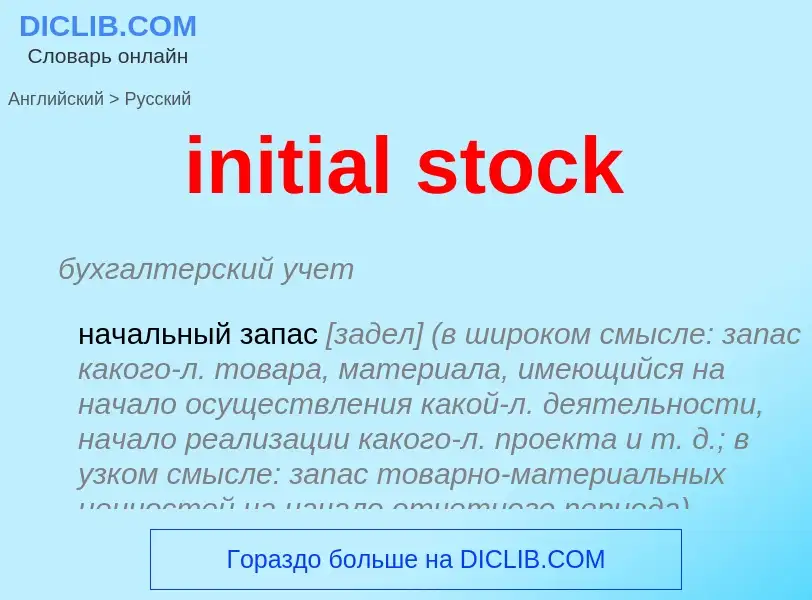Traducción y análisis de palabras por inteligencia artificial ChatGPT
En esta página puede obtener un análisis detallado de una palabra o frase, producido utilizando la mejor tecnología de inteligencia artificial hasta la fecha:
- cómo se usa la palabra
- frecuencia de uso
- se utiliza con más frecuencia en el habla oral o escrita
- opciones de traducción
- ejemplos de uso (varias frases con traducción)
- etimología
initial stock - traducción al Inglés
бухгалтерский учет
начальный запас [задел] (в широком смысле: запас какого-л. товара, материала, имеющийся на начало осуществления какой-л. деятельности, начало реализации какого-л. проекта и т. д.; в узком смысле: запас товарно-материальных ценностей на начало отчетного периода)
синоним
2) начальный задел (напр. полуфабрикатов)
общая лексика
буквица, инициал "в оборку"
большая первая буква в начале главы или статьи. Имеет существенно большие размеры, чем остальные, и размещается так, что её верх находится на уровне первой строки абзаца. Если верх буквицы находится выше первой строки, то она называется initial
профессионализм
"фонарь"
Смотрите также
Definición
Wikipedia
An initial public offering (IPO) or stock launch is a public offering in which shares of a company are sold to institutional investors and usually also to retail (individual) investors. An IPO is typically underwritten by one or more investment banks, who also arrange for the shares to be listed on one or more stock exchanges. Through this process, colloquially known as floating, or going public, a privately held company is transformed into a public company. Initial public offerings can be used to raise new equity capital for companies, to monetize the investments of private shareholders such as company founders or private equity investors, and to enable easy trading of existing holdings or future capital raising by becoming publicly traded.
After the IPO, shares are traded freely in the open market at what is known as the free float. Stock exchanges stipulate a minimum free float both in absolute terms (the total value as determined by the share price multiplied by the number of shares sold to the public) and as a proportion of the total share capital (i.e., the number of shares sold to the public divided by the total shares outstanding). Although IPO offers many benefits, there are also significant costs involved, chiefly those associated with the process such as banking and legal fees, and the ongoing requirement to disclose important and sometimes sensitive information.
Details of the proposed offering are disclosed to potential purchasers in the form of a lengthy document known as a prospectus. Most companies undertake an IPO with the assistance of an investment banking firm acting in the capacity of an underwriter. Underwriters provide several services, including help with correctly assessing the value of shares (share price) and establishing a public market for shares (initial sale). Alternative methods such as the Dutch auction have also been explored and applied for several IPOs.


![Greek biblical text from [[Papyrus 46]], of c. 200, with no initials, punctuation, and barely spaces between words Greek biblical text from [[Papyrus 46]], of c. 200, with no initials, punctuation, and barely spaces between words](https://commons.wikimedia.org/wiki/Special:FilePath/P46.jpg?width=200)
![5th century [[Codex Alexandrinus]] with initials in left margin 5th century [[Codex Alexandrinus]] with initials in left margin](https://commons.wikimedia.org/wiki/Special:FilePath/Codex Alexandrinus f41v - Luke.jpg?width=200)
![Coptic]] manuscript, 6th-14th century, Metropolitan museum of Art, New-York Coptic]] manuscript, 6th-14th century, Metropolitan museum of Art, New-York](https://commons.wikimedia.org/wiki/Special:FilePath/Leaves from a Coptic Manuscript MET sf21-148-1as2.jpg?width=200)
!["Diminuendo" effect in the first letters after this initial from the [[Cathach of St. Columba]] (Irish, 7th century) "Diminuendo" effect in the first letters after this initial from the [[Cathach of St. Columba]] (Irish, 7th century)](https://commons.wikimedia.org/wiki/Special:FilePath/CathachOfStColumba.jpg?width=200)
![One of thousands of smaller decorated initials from the [[Book of Kells]] One of thousands of smaller decorated initials from the [[Book of Kells]]](https://commons.wikimedia.org/wiki/Special:FilePath/KellsDecoratedInitial.jpg?width=200)
![''In principio'' from the start of the [[Gospel of John]], 9th century ''In principio'' from the start of the [[Gospel of John]], 9th century](https://commons.wikimedia.org/wiki/Special:FilePath/Meister der Franko-Sächsischen Gruppe 001.jpg?width=200)
![Georgian letter]] "D" from the [[Mokvi Gospels]] Georgian letter]] "D" from the [[Mokvi Gospels]]](https://commons.wikimedia.org/wiki/Special:FilePath/Illuminated capital letter D, Mokvi Gospels (2).jpg?width=200)

![Opening from the [[Mainz Psalter]], printed in 1457, with small printed and large drawn initials. Opening from the [[Mainz Psalter]], printed in 1457, with small printed and large drawn initials.](https://commons.wikimedia.org/wiki/Special:FilePath/Mainz - Johann Fust & Peter Schoeffer (printers) - Mainz Psalter - Google Art Project.jpg?width=200)
![Fraktur]] Fraktur]]](https://commons.wikimedia.org/wiki/Special:FilePath/Fraktur.png?width=200)
![[[Alexander Agricola]]'s score: "Fortem virili" [[Alexander Agricola]]'s score: "Fortem virili"](https://commons.wikimedia.org/wiki/Special:FilePath/Agricola.jpg?width=200)
